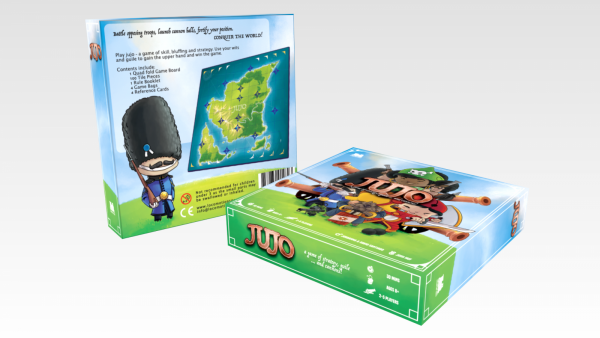Preview: Play Tiles, Create Runs, and Blow Up Opponents in Jujo

Pirate Penelope is creating a run, but watch out, Dapper Dog brings cannons out on to the field to break her ranks!
Currently on Kickstarter, Jujo is an engaging tile-laying, area control game, where each turn you lay one tile on the board, trying to create runs of two or more pieces while breaking up those of your opponents.
Gameplay
Jujo is played on a game board that shows a grid of squares. You use more or less of the board based on player count. Each player takes the twenty-five tiles that belong to their team, randomly removes five, and plays the game with the remaining twenty.
On your turn you place one of your team tiles on the board, face up. Players score points by creating runs — two or more of their tiles that touch in a line. Tiles in a run must have a point number on them, and you can have multiple runs. Since tiles are circular, they do not touch diagonally.
Each player has tiles that show various point values, but you also have explosion tiles and cannon tiles. When an explosion tile is placed on the board, it causes all adjacent tiles to flip, while a cannon will cause two tiles to flip (which two depends on the direction you place the cannon). When most tiles flip, they will flip over to a blank side, being worth zero points and ending any runs they were connected to. However, some tiles when flipped will reveal an ambulance which is worth one point and remains part of a run, a wall which is worth four points and can be part of a run, or a defused bomb which can be worth three to four points and also be part of a run. In addition, a defused bomb forces cannons and explosive tiles to be flipped over so that they will no longer attack any subsequent tiles that are placed near them. Your own explosives and cannons do not attack your own pieces.
Players also have fox tiles, which cannot be attacked by explosives or cannons, and are worth one point for every set of two that you play on the board, and fort tiles which can be used to protect an adjacent tile.
The board also has power up spaces, which show numbers ranging from two to five. Any tile that has a point value, and is placed on a square that touches one of these power ups, is worth additional points equal to the number written on the power up.
Once players have placed all their tiles on the board, the game ends and players calculate their points. The player with the most points wins the game.

Review
Jujo is an enjoyable blend of area control and bluffing. You’re trying to guess where players have placed their ambulances or wall cards so as not to waste explosives or cannons, as well as using your own in the most tactically effective ways.
There’s plenty of strategy in the game as you try to set up strong moves and protect your high numbered tiles, but also prevent your opponents from creating long runs and scoring high. This means you have to think several moves ahead — but there’s plenty of player interaction as you adapt to your opponents’ turns. At full player count, downtime can become a little long, however, if players spend too much time contemplating their move.
The strategy paired with the simplicity of the rules and setup is where Jujo shines the most. It’s a really easy game to pick up and get on the table, and immensely satisfying to play. The discarding of five random tiles by each player at the start of the game also ensures variation from game to game.
Additionally, component quality of the prototype was impressive, with the exception of the rulebook which left a few areas confusing and could use a couple examples of play.
Simple yet engaging, Jujo is great, strategic fun with an interesting scoring mechanism that leads to some tough choices. There’s plenty of room to take an offensive gameplay style, defensive, or some mixture of the two. The artwork is entertaining, the characters fun. Check it out on Kickstarter and see for yourself.
Pros: High quality components, interesting scoring mechanism, nice blend of strategy and easy to learn rules
Cons: Rulebook could use some improvement in the prototype, downtime at full player count
Disclosure: this preview is based on our evaluation of an unpublished prototype of the game, which is subject to change prior to publication. While a modest payment was received to expedite the review process, our thoughts and opinions expressed here are honest and accurate.




